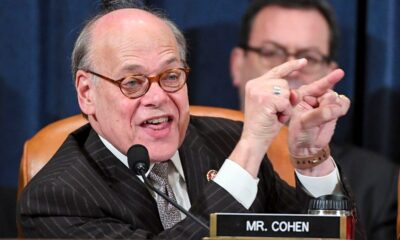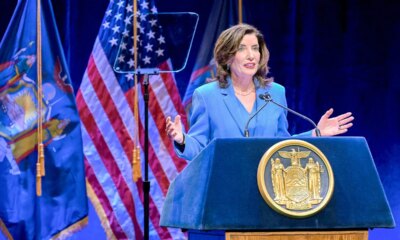News
2024 Presidential Election Calendar

92 DAYS UNTIL ELECTION DAY
Take a look at important dates and voting deadlines in your state. States vary in when they send out mail ballots and when completed ballots need to be received. Election rules may still be changed by states. This calendar will be updated regularly.
Conventions
The Republican Party held its national convention in July at which it formally nominated former President Donald J. Trump and JD Vance as its presidential and vice presidential candidates. The Democratic National Convention is scheduled for late August.
Democrats will convene in Chicago to formally nominate the party’s presidential and vice presidential candidates.
Aug. 19–22
Democratic National Convention
Debates
President Biden and Mr. Trump participated in a presidential debate hosted by CNN on June 27 and had agreed to a second one on Sept. 10, to be hosted by ABC News. After Mr. Biden’s exit from the race — spurred in part by his debate performance — Mr. Trump proposed changes to the schedule.
New date proposed by Mr. Trump to debate Vice President Kamala Harris on Fox News. This would replace the Sept. 10 debate Mr. Trump and Mr. Biden originally agreed on. Ms. Harris had not agreed to this change as of Aug. 5.
The original date for Mr. Biden and Mr. Trump’s second debate.
The campaigns have not yet agreed on having a vice presidential debate.
Sept. 4
Proposed Presidential Debate
Sept. 10
Scheduled Presidential Debate
T.B.D.
Vice Presidential Debate
Vote by mail
A majority of voters live in states that allow voting by mail, though some states require an excuse — like travel, work or illness — to be eligible to receive a ballot. Many states have deadlines to request mail ballots that are less than two weeks before Election Day, but the Postal Service recommends that voters request them as early as possible and mail them at least one week before their state’s ballot return deadline.
To be counted, ballots in some states must be postmarked by a certain date, while some states require them to be received by a certain time (often by poll close time on Election Day). This deadline may be different for ballots returned in person, as opposed to through the mail. Check with your county officials for more details.
Each circle below represents one state.
Mail voting period begins
Deadline to request ballot by mail
Deadline for mail ballots to be returned
Note: The mail ballot return deadline for 32 states is Nov. 5. Some states do not provide an exact date they start sending mail ballots to voters. The earliest date on which ballots are sent may vary from dates in the table. Dates shown above are for domestic voters in those states, deadlines for those in the military or living abroad may differ.
Mail voting period begins
Deadline to request ballot by mail
Postmark deadline for ballots returned by mail
| Nov. 4 | North Dakota, Ohio, Utah |
|---|---|
| Nov. 5 | Alaska, California, District of Columbia, Illinois, Kansas, Maryland, Mississippi, Nevada, New Jersey, New York, Oregon, Texas, Virginia, Washington, West Virginia |
Deadline for mail ballots to be returned
States with return deadlines after Nov. 5 require ballots to be postmarked by Election Day.
| Nov. 4 | Louisiana | |||
|---|---|---|---|---|
| Nov. 5 | Alabama, Arizona, Arkansas, Colorado, Connecticut, Delaware, Florida, Georgia, Hawaii, Idaho, Indiana, Iowa, Kentucky, Maine, Massachusetts, Michigan, Minnesota, Missouri, Montana, Nebraska, New Hampshire, New Mexico, North Carolina, Oklahoma, Pennsylvania, Rhode Island, South Carolina, South Dakota, Tennessee, Vermont, Wisconsin, Wyoming | |||
| Nov. 6 | Texas | |||
| Nov. 8 | Kansas, Virginia | |||
| Nov. 9 | Nevada, Ohio | |||
Early voting
Starting in September, voters can visit a polling location or cast their absentee ballot in person in states that allow one or both methods. For many states, early voting rules vary by county, so check with local officials for details.
Early voting starts
Early voting ends
Oct. 29
Louisiana
Oct. 31
Maryland, Tennessee
Nov. 1
Arizona, Georgia, Idaho, Massachusetts, Texas, Utah
Nov. 2
Florida, Kentucky, Nevada, New Mexico, North Carolina, Oklahoma, South Carolina, Virginia, West Virginia
Nov. 3
Connecticut, Delaware, District of Columbia, Michigan, New Jersey, New York

News
Second US aircraft carrier is being sent to the Middle East, AP source says, as Iran tensions high
WASHINGTON (AP) — The United States will send the world’s largest aircraft carrier to the Middle East to back up another already there, a person familiar with the plans said Friday, putting more American firepower behind President Donald Trump’s efforts to coerce Iran into a deal over its nuclear program.
The USS Gerald R. Ford’s planned deployment to the Mideast comes after Trump only days earlier suggested another round of talks with the Iranians was at hand. Those negotiations didn’t materialize as one of Tehran’s top security officials visited Oman and Qatar this week and exchanged messages with the U.S. intermediaries.
Already, Gulf Arab nations have warned any attack could spiral into another regional conflict in a Mideast still reeling from the Israel-Hamas war in the Gaza Strip. Meanwhile, Iranians are beginning to hold 40-day mourning ceremonies for the thousands killed in Tehran’s bloody crackdown on nationwide protests last month, adding to the internal pressure faced by the sanctions-battered Islamic Republic.
The Ford’s deployment, first reported by The New York Times, will put two carriers and their accompanying warships in the region. Already, the USS Abraham Lincoln and its accompanying guided-missile destroyers are in the Arabian Sea.
The person who spoke to The Associated Press on the deployment did so on condition of anonymity to discuss military movements.
Ford had been part of Venezuela strike force
It marks a quick turnaround for the Ford, which Trump sent from the Mediterranean Sea to the Caribbean last October as the administration build up a huge military presence in the lead-up to the surprise raid last month that captured then-Venezuelan President Nicolás Maduro.
It also appears to be at odds with Trump’s national security strategy, which put an emphasis on the Western Hemisphere over other parts of the world.
Trump on Thursday warned Iran that failure to reach a deal with his administration would be “very traumatic.” Iran and the United States held indirect talks in Oman last week.
“I guess over the next month, something like that,” Trump said in response to a question about his timeline for striking a deal with Iran on its nuclear program. “It should happen quickly. They should agree very quickly.”
Trump told Axios earlier this week that he was considering sending a second carrier strike group to the Middle East.
Trump held lengthy talks with Israeli Prime Minister Benjamin Netanyahu on Wednesday and said he insisted to Israel’s leader that negotiations with Iran needed to continue. Netanyahu is urging the administration to press Tehran to scale back its ballistic missile program and end its support for militant groups such as Hamas and Hezbollah as part of any deal.
The USS Ford set out on deployment in late June 2025, which means the crew will have been deployed for eight months in two weeks time. While it is unclear how long the ship will remain in the Middle East, the move sets the crew up for an usually long deployment.
The White House didn’t immediately respond to a request for comment.
Ford’s deployment comes as Iran mourns
Iran at home faces still-simmering anger over its wide-ranging suppression of all dissent in the Islamic Republic. That rage may intensify in the coming days as families of the dead begin marking the traditional 40-day mourning for the loved ones. Already, online videos have shown mourners gathering in different parts of the country, holding portraits of their dead.
One video purported to show mourners at a graveyard in Iran’s Razavi Khorasan province, home to Mashhad, on Thursday. There, with a large portable speaker, people sang the patriotic song “Ey Iran,” which dates to 1940s Iran under the rule of Shah Mohammad Reza Pahlavi. While initially banned after the 1979 Islamic Revolution, Iran’s theocratic government has played it to drum up support.
“Oh Iran, a land of full of jewels, your soil is full of art,” they sang. “May evil wishes be far from you. May you live eternal. Oh enemy, if you are a piece of granite, I am iron.”
___
Gambrell reported from Dubai, United Arab Emirates. Associated Press writer Aamer Madhani contributed to this report.
News
What the data tells us about kidnapped people — and how Nancy Guthrie is an outlier

Nancy Guthrie’s case has drawn wide attention, in part because of the unique circumstances of her disappearance. She’s seen here alongside other people who are listed on the FBI’s Kidnappings and Missing Persons page as of Thursday morning./FBI/ Screenshot by NPR
The abduction of Nancy Guthrie is putting a spotlight on the excruciating uncertainty endured by thousands of families whose loved ones go missing each year. Experts see parallels with those cases, even as many details in Guthrie’s case are unique, from the victim’s age to her celebrity daughter, Today show co-host Savannah Guthrie.

The circumstances of Guthrie’s disappearance are “quite shocking,” says Jesse Goliath, a forensic anthropologist at Mississippi State University.
“Usually you hear about smaller children, juveniles that go missing” and attracting national press, Goliath says. “But having an older woman who’s gone missing and having [a daughter] that you’ve seen on TV every day” is extraordinary, he adds.
More than 500,000 people were reported missing in the U.S. last year, according to the Justice Department. But Tara Kennedy, media representative for the Doe Network, a volunteer group working to identify missing and unidentified persons, says high-profile kidnappings are rare.
“I can’t remember the last time I heard about a ransom case besides Guthrie,” says Kennedy, who has worked with the Doe Network since 2014. “I always associate them with different periods in American history, like the Lindbergh kidnapping, not someone’s mother from the Today show.”
Both Kennedy and Goliath describe the Guthrie case as “strange.” Here’s a rundown of things it has in common with other missing-persons cases, and why it’s unusual:
Key details that are “unheard of”
From June 2020 to June 2025, women comprised more than 75% of the victims in the some 240,000 cases of kidnappings or abductions that were reported in the U.S., according to FBI crime data. But of those, only 646 women were in their 80s like Nancy Guthrie, who is 84, or less than .2% of all victims. Compare that to the age group that accounted for the largest number of victims that year: people 20-29, who made up just shy of 30% of victims.
Other highly unusual revelations have emerged as her disappearance has persisted: from purported ransom notes sent to media outlets demanding millions of dollars to unsettling images of a masked gunman approaching Guthrie’s front door on the night she disappeared.
Taken together, it’s like something out of a true crime novel, Goliath says: “That’s something unheard of.”
In missing-person cases, a quick response is crucial
TV shows have helped perpetuate a myth that families have to wait 24 hours before reporting a loved one as missing. But some shows and movies do get one thing right: The first 24 to 48 hours are critical to locating someone who has disappeared.
“Usually a lot of them are going to be [found] within 24 hours, especially the juvenile and young adult cases,” Goliath says.
In that early timeframe, eyewitness reports might be more useful; sniffer dogs will have a fresher scent to follow; and surveillance video and other electronic data is more likely to be intact and helpful.
“The longer the person is missing, the more difficult it becomes” to find them, Kennedy says, citing decades-old unresolved cases.
Then there’s the victim’s health. Whether the subject of a search operation wandered off and got lost, or was abducted or trafficked, Goliath notes that after 48 hours, their well-being could be compromised — by the elements, or by health issues such as Nancy Guthrie’s pacemaker and her need for daily medication.
“Sadly, if that person is not found within that first two days, their chances of survival drop exponentially,” Goliath says.
Who are the people who go missing in the U.S.?
At any given moment, about 100,000 people are considered missing in the U.S., according to Goliath and Kennedy. At the end of 2024, for instance, the National Crime Information Center — listed more than 93,000 active missing-persons cases in the U.S., while a total of 533,936 cases were entered into the federal tracking system that year.
Of those cases, more than 60% — or roughly 330,000 — involved juveniles, according to the NCIC database, which law enforcement agencies use to share criminal warrants, missing-person alerts, and other records.
Among people who are reported missing, Goliath says there is an “overrepresentation of Black and Indigenous populations who go missing, especially females, across the United States.”
In Mississippi, he adds, “Our highest demographic of missing [persons] is young Black females.”
Black Americans are also overrepresented in abductions. While members of the group make up less than 15% of the U.S. population, they account for more than 25% of the victims in reported abductions or kidnappings, according to the FBI’s data.
But a large number of missing-persons cases also go unreported, because some communities, such as people of color or those who don’t have documented status in the U.S., are less likely to engage with authorities. And Goliath notes that Indigenous people living on reservations might have limited access to law enforcement.
Another dynamic that skews public perception, Kennedy says, is “missing white woman syndrome,” when national media become fixated on a white woman who has disappeared.
“As someone who researches cold cases in terms of looking for information, the disparity of information out there, of cases for people of color is ridiculous,” she says.
Calling for action, easier ways to share data
Goliath says every missing-person case, not just Guthrie’s, needs to be widely broadcast and shared, to increase the chance of bringing someone home.
“We call this a silent crisis,” he says, “that there are people missing in the United States, throughout the country that really don’t have that same social media representation or a nationwide media representation for their cases.”
It’s also difficult to find standardized data for missing persons, due to a patchwork of rules and resources. It’s only mandatory for law enforcement agencies across the country to report missing persons cases to the federal government if they involve minors, for instance.
In addition to NCIC, missing persons data is collected by NamUs (the National Missing and Unidentified Persons System), which offers public access. But as of now, only 16 states require mandatory reporting to the NamUs clearinghouse for missing persons cases.
Goliath says he’d like to see a nationwide push for more states to adopt NamUs requirements. As NPR reported last year, a large portion of U.S. police agencies weren’t listed in the system.
“That’d be a help, because it’s already a system that exists,” Goliath says. “Law enforcement already is doing it. So, let’s just have all the states be able to use NamUs.”
News
US Colleges received more than $5 billion in foreign gifts, contracts in 2025

The top 10 countries that gave contracts and gifts to U.S. colleges and universities as of December 16, 2025.
Screenshot by NPR/The U.S. Department of Education
hide caption
toggle caption
Screenshot by NPR/The U.S. Department of Education
U.S. colleges received more than 5 billion dollars in reportable foreign gifts and contracts in 2025, according to a new website from the U.S. Education Department. The release is part of a push by the Trump administration to make foreign influence in colleges and universities more transparent.
Among the biggest recipients, the data show, are Carnegie Mellon University, Harvard University, the Massachusetts Institute of Technology and Stanford University.

Qatar was the largest foreign source of funds to schools, making up more than 20% — or about 1.1 billion. Other sources include the United Kingdom, China, Switzerland and Japan.
In a statement, Education Secretary Linda McMahon said the data provide “unprecedented visibility into funding” from countries that threaten “America’s national security.”
Under existing federal law, institutions are required to report gifts or contracts from foreign entities above $250,000. But Republicans have long raised underreporting as an issue of national security — pushing for more reporting and more transparency.
Since the start of President Trump’s second term, the administration has investigated Harvard University and the University of California, Berkeley, for allegedly underreporting their foreign gifts.
Ian Oxnevad, a senior fellow at the National Association of Scholars, a conservative advocacy organization, called the release of the new information a “step in the right direction.”
He said the data brings welcome transparency to the sometimes murky world of foreign gifts to U.S. colleges. This data sheds light on “specific countries, what universities they donate to, and the amounts.“
Among the significant revelations, he noted, are that “Qatar and China are among the top countries that donate to our universities, and not our allies or neighbors.”
The new website includes data on what McMahon called “countries of concern,” including China, Russia and Iran. Harvard, New York University and MIT top the list of schools getting money from those countries.
It’s important, Oxnevad said, given the role that universities such as Harvard and other Ivy League schools play in shaping public policy, to be aware that they’re “getting such heavy foreign funds.”
Universities have said they are in compliance with the law.
“MIT research on campus, regardless of funding source, is open and publishable,” the university said in a statement. “We follow all federal laws in accepting and reporting any such gifts or contracts.”
The American Council on Education, a member organization that represents and advocates for colleges and universities, echoed that sentiment.
“This demonstrates that our institutions are doing a good job reporting this information,” says Sarah Spreitzer, vice president and chief of staff at ACE.
Both Spreitzer and Oxnevad pointed out limitations in the data on the website, including a lack of details or an ability to compare years and see trends over time. Both were critical of the government’s tracking and reporting of this information under past administrations.
But Spreitzer added that some of the information, without more context or detail, is misleading, or at best dated.
“I worry that [the administration] is trying to send a message to taxpayers that our institutions are taking a lot of money from foreign donors,” says Spreitzer. “We are all for more transparency.”
Her concern though, she said, is how the Trump administration will use this data in its continuing attacks on higher education.
-

 Politics1 week ago
Politics1 week agoWhite House says murder rate plummeted to lowest level since 1900 under Trump administration
-

 Alabama6 days ago
Alabama6 days agoGeneva’s Kiera Howell, 16, auditions for ‘American Idol’ season 24
-

 Politics1 week ago
Politics1 week agoTrump unveils new rendering of sprawling White House ballroom project
-

 San Francisco, CA1 week ago
San Francisco, CA1 week agoExclusive | Super Bowl 2026: Guide to the hottest events, concerts and parties happening in San Francisco
-

 Ohio1 week ago
Ohio1 week agoOhio town launching treasure hunt for $10K worth of gold, jewelry
-

 Culture1 week ago
Culture1 week agoAnnotating the Judge’s Decision in the Case of Liam Conejo Ramos, a 5-Year-Old Detained by ICE
-

 Culture1 week ago
Culture1 week agoIs Emily Brontë’s ‘Wuthering Heights’ Actually the Greatest Love Story of All Time?
-

 News1 week ago
News1 week agoThe Long Goodbye: A California Couple Self-Deports to Mexico















